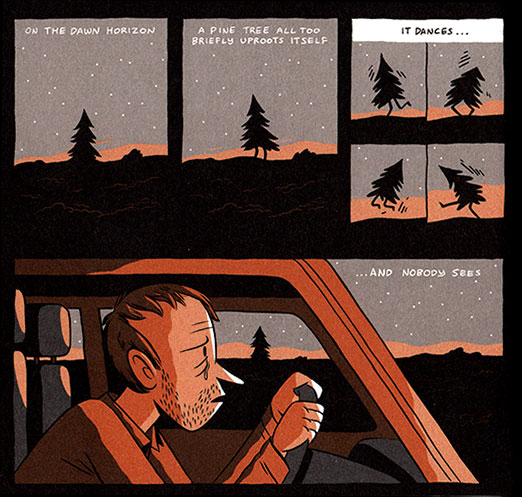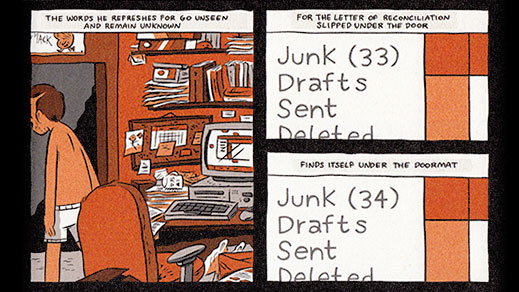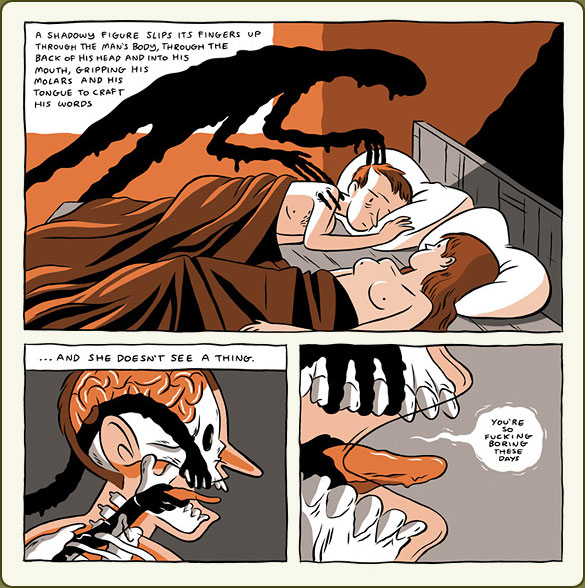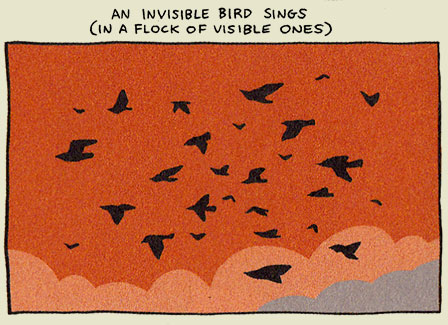Everything We Miss
I was a person once. I had a story. I had a girl. My story with that girl came to a stuttering, ramshackle end. I was the only one in the universe. Me and the girl. But a lot of times only me. I was, after all, a person once. And as a person, I carried with me in a valise handcuffed to my soul, that self-centeredness and wholly personal awareness that marks all persons. I was a person like you are a person. And we, as persons, miss a whole helluva lot of everything. Because that's the nature of seeing only out of, what? a maximum of two eyes. That's the nature of having a sense of self that is wholly bound up in the self. We're going to miss a lot.
 Like this.
Like this.
And all of it, all of that multiverse of things we miss, in some sense or another is important. Maybe not important to us—but then we're proven to be pretty poor observers and aren't exactly working with anything near enough a representative sample to weigh in on What's Important. Who knows what we might miss. We certainly don't. Because we missed it. Because that's what persons do. And I was a person once. And because I still am, Luke Pearson's Everything We Miss was a wholly worthwhile read.
Pearson has made something of a beginning of a name for himself in the States, having written two of the most delectable child-accessible comics available. Hildafolk and Hilda and the Midnight Giant (and presumably the forthcoming-to-American-shores third book in the series) are works of happy whimsy. Even when troubles arise, they represent only adventures to be had. Even at the Hilda stories' most melancholy, they remain buoyant and hopeful. From Everything We Miss' cover (featuring a man of forlorn demeanor being stalked by a figure of pure shadow), I was aware that Pearson had crafted a departure from what I knew him for. I knew the book's content might be grim. I knew its central dilemma concerned a relationship nearing its inevitable close. What I didn't know was just how much I would be smiling and laughing while I read about this terribly mopey circumstance.
 This happens.
This happens.
Pearson, it turns out (as it was meant to turn out, Bokonon reminds us!), is a magician. He's the kind of illusionist who pulls back the illusory veil of reality to show us what we might have seen for ourselves if only we were awesome. He did it with Hildafolk (and its children) and he's done it again here, albeit in a wholly more adult (and therefore, more dour) way.
In Everything We Miss, Pearson peels back into omniscience to show numerous of the Things Not Seen by those who are looking hard in other directions. The work principally concerns people who are having a rough time of it, people whose lives haven't been the wonderful day-glo theme parks advertised when they bought the ticket and took the ride. A couple that cares for each other but says hateful things to unconsciously drive one from the other. A man with testicular cancer who remains scared but still unaware of his ailment. A lonely girl who tries to catch a lonely man's eye but fails in every attempt. An overweight older man who while not always older was still always overweight. A man cries and no one sees.
 I always wondered why people say the things they say. These shadow creatures basically rule the internet.
I always wondered why people say the things they say. These shadow creatures basically rule the internet.
And all of these people are so wrapped up in their own desires, dreams, and perception of failure that they miss a hundred wonderful things happening right next to them. A tree dances. A wife levitates in her sleep. Ghosts walk. Giants bowl. Cats stroll. And stranger things go about their stranger business. Pearson interweaves these happenstances without seam. They are part of the world he tells and so he tells them—as naturally as if no more shocking than a man driving a car or brushing his teeth or taking his life. These are mundane things that we only think extraordinary because we don't notice them happening daily under our noses, behind our backs, around our ears.

If I had to guess what Pearson was trying to get at with this short book, I'd say it was perspective. That may not have been his target at all. Maybe he just wanted to tell the story of his ex-girlfriend super badly and do so in a way that she might feel bad for being his ex-girlfriend. Maybe he really sees the things he depicts. It doesn't really matter (well, for he and his it does of course). Whether he intended it or not, Everything We Miss is a wonderful prod to get the reader to pause for a moment and attempt to imagine that they are not the center of all things. That even though the reader may be a unique and beautiful snowflake, there are a million other such snowflakes out there. And probably a whole lot of other things even more worthwhile than snowflakes. Pearson offers the opportunity for even a momentary paradigm shift, a chance to see beyond the veneer of reality into a universe of other matters and, perhaps, greater matters. Because what person can't use the occasional challenge to the throne of their personal monarchy?
Good Ok Bad features reviews of comics, graphic novels, manga, et cetera using a rare and auspicious three-star rating system. Point systems are notoriously fiddly, so here it's been pared down to three simple possibilities:
3 Stars = Good
2 Stars = Ok
1 Star = Bad
I am Seth T. Hahne and these are my reviews.
Browse Reviews By
Other Features
- Best Books of the Year:
- Top 50 of 2024
- Top 50 of 2023
- Top 100 of 2020-22
- Top 75 of 2019
- Top 50 of 2018
- Top 75 of 2017
- Top 75 of 2016
- Top 75 of 2015
- Top 75 of 2014
- Top 35 of 2013
- Top 25 of 2012
- Top 10 of 2011
- Popular Sections:
- All-Time Top 500
- All the Boardgames I've Played
- All the Anime Series I've Seen
- All the Animated Films I've Seen
- Top 75 by Female Creators
- Kids Recommendations
- What I Read: A Reading Log
- Other Features:
- Bookclub Study Guides










